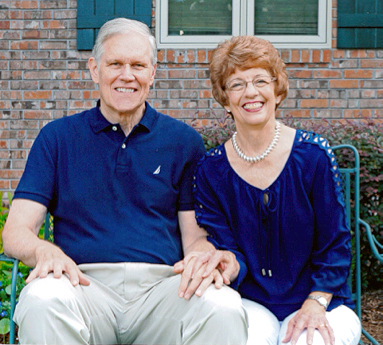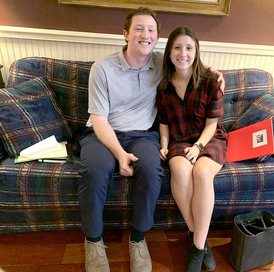
A platform that encourages healthy conversation, spiritual support, growth and fellowship

NOLACatholic Parenting Podcast
A natural progression of our weekly column in the Clarion Herald and blog

The best in Catholic news and inspiration - wherever you are!
Couple-to-couple approach is a boon to marriage preparation
-

By Peter Finney Jr.
Clarion HeraldJan and Lloyd Tate will be married for 49 years next February, and for 45 of those years – which is amazing even for themselves to grasp – they’ve been consumed by what they consider to be a special mission to help engaged couples prepare for the reality of life far beyond their wedding day.
Along the way, they discovered something fundamental about marriage preparation in the Catholic Church: Not that any other forms of marriage prep fail to offer useful advice, but the mentor-couple, two-on-two approach that they have embraced seems to be the richest preparation available.
“We’ve gone through many styles of programs over almost 45 years of ministry,” Jan said, “but for probably the last 30 years we’ve pretty much done the mentor-couple program.”
One of the major reasons the mentor couple program succeeds, the Tates say, is obvious: In the process of delving into marriage issues over six, 2 1/2-hour sessions with a mentor couple, the engaged couple not only gets a fuller and more focused discussion of issues but also develops a long-lasting relationship with an older couple who can offer guidance when the young marriage hits the inevitable stumbling block.
Family issues discussed
Quite often, the husband- or wife-to-be comes from a divorced home, and sometimes both have had divorced parents.“We’ve seen the needs of the couple for the mentor approach are so much greater because of the number of engaged couples coming from divorced homes,” Jan said. “They really don’t have an idea about how to make a successful marriage.”
The results of the mentor couple approach have been astounding, the Tates say. One couple they recently prepared lived out of town – a seven-hour drive from New Orleans – but they drove in for each session, even though the Tates offered to do the sessions through Zoom.
“We spent 3 1/2 hours with them for the first session and the groom said at the end, ‘Can we just come here for all of our sessions? We don’t want to do it on a computer,’” Jan said. “They drive seven hours here and seven hours back because they see the benefit, and we’re spending a lot more time with them.”
“One day of training wouldn’t have cut it for them,” Lloyd added.
 Adjustments during pandemic
Adjustments during pandemic
With COVID restrictions in place since March, some engaged couples are a little more leery of attending large-group sessions, and the Tates say they are preparing more couples individually than ever.“At the beginning when everything was locked down, we actually greeted the couple in the front yard and brought them around the back of the house to sit on the patio,” Lloyd said. “We do things inside now, but we keep about seven or eight feet apart, and it’s worked well.”
Uncertainty about dates
One of the major challenges all engaged couples are facing right now is the uncertainty of social-distancing restrictions, which makes planning a wedding and a reception extremely difficult and can increase the stress levels for both the couple and their extended families.“Many couples have had to change their dates for the church and the reception either because of travel restrictions or capacity limits for the reception,” Lloyd said. “Many have postponed their weddings, sometimes multiple times. Some are going forward with the wedding but maybe on a smaller scale with a small party for the immediate family. A big reception with music is just a no-go these days. These are considered ‘super-spreader’ events, and many couples are bypassing that.
“It’s creating some stress because some of the reception halls are not making refunds. Many of them require a deposit of at least half the amount or more up front. Some are saying they will give a credit, but not a refund. So, that’s a lot of stress on the couple. As the ceremony gets closer, it’s a great stressor. And, then, you throw COVID into the mix.”
One couple he heard of had just a week to change reception plans after the city of New Orleans cut capacity limits in half, which meant the couple had to call to disinvite many guests.
“That would add a lot of stress on anyone,” Lloyd said.
The Tates are not concentrating so much on the wedding plans but on a couple’s readiness for marriage and how their relationship can lead to a successful marriage.
“Really, the important thing is the sacrament,” Jan said. “Even if you have to forgo the big party, have the sacrament, have the memories in the church with your family at your side, and then on your first anniversary, plan on having a reception. Some people have told us reception venues are trying to accommodate that.”
Money discussions are critical
Money is always a major issue in any marriage, which is why the Tates spend so much time discussing this with engaged couples.“Money is a stressor, and a lot of these couples, both the bride and groom are working – and some of them don’t have as much work or they’re not getting paid as much as they were before,” Jan said. “We really try to impress upon them that it’s much safer for a couple to start out not depending on both salaries and to try to save at least half of the second salary to build up their funds. You never know when an emergency is going to come up, like needing to evacuate or fixing up your house or removing the tree that fell down in your yard. We encourage good stewardship and help them understand that tightening the belt pays off in the long run.”
Lloyd, a CPA, also said debt coming into a marriage is a huge issue.
“Most of these couples have student loan debt, so they’re starting off with something they have to deal with,” Lloyd said. “A lot of couples are contributing to the cost of their wedding and reception. But whether or not you have the most perfect party or dress or reception – 50 years from now you’re not going to remember that. You’ll only remember if you had a good day together.
In 2002, the Tates wrote “The In-Home Marriage Preparation” program that has been the template for training many other mentor couples. Several parishes in the Archdiocese of New Orleans have a number of mentor couples, but the need is always there for more. The archdiocesan guidelines for marriage state a preference for engaged couples using the mentor couple approach whenever possible.
“They prefer a more robust option, which is more our program and the Engaged Encounter weekend, where you get more in-depth, longer-lasting information,” Lloyd said. “It’s not just a quick, one-day thing where you can’t absorb it all.”
Jan likens Advent – which is a season of quiet and preparation – to good marriage preparation.
“It seems to me that the church offers us both the Advent season and robust marriage preparation programs for the same reason,” she said. “During Advent, the church exhorts us to turn our focus away from the noise and bustle of daily life, away from the materialism and consumerism that afflicts our culture on a daily basis, and to turn instead toward the person we are preparing to celebrate at Christmas.
“Robust marriage preparation has a similar objective. We are offering to the engaged couple a time to withdraw from the hustle and bustle of planning for a day to focus on preparing for a lifetime of living a sacramental marriage.” The Tates still receive Christmas cards and notes from many of the estimated 300 couples they have prepared for marriage over the years.
“They will also call us two, five, 10 or 15 years into their marriage and say, ‘We need some ‘Jan and Lloyd’ time,’” Lloyd said. “They tell us what they’re struggling with, and we talk with them and pray with them. We’ve been godparents to their children. They’re like extended family to us.”




